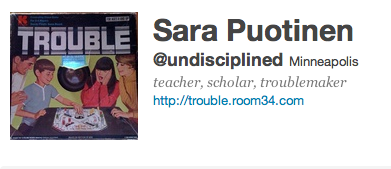…and my 150th post! My pace of writing on this blog has definitely slowed down this past year; actively writing on four different blogs + other writing projects + teacher prep = less entries on each blog. Is this a bad thing? Not necessarily…the great work that I started on this blog has inspired me to keep pushing and experimenting in my thinking, writing and teaching. This has necessarily led me to push beyond and outside the limits of this particular cyberspace.
Anyway, ever since I started thinking about using twitter in the classroom this summer, I have wondered what sort of self is performed/produced/crafted on twitter. This question became even more intriguing after I read Peggy Orenstein’s essay, “I Tweet, Therefore I Am”–particularly this passage:
The fun of Twitter and, I suspect, its draw for millions of people, is its infinite potential for connection, as well as its opportunity for self-expression. I enjoy those things myself. But when every thought is externalized, what becomes of insight? When we reflexively post each feeling, what becomes of reflection? When friends become fans, what happens to intimacy? The risk of the performance culture, of the packaged self, is that it erodes the very relationships it purports to create, and alienates us from our own humanity.
Shortly after this essay appeared on NY Times, I raised some questions about it on It’s Diablogical:
1. What is the relationship between authenticity and performativity? Is the performed (crafted) self necessarily a “packaged” self? Why can’t that self be seen as authentic?
2. Is tweeting (and blogging for that matter) only about confessing/documenting/making public the “excruciating minutia of our lives” (as Elaine on Seinfeld once uttered) or our unfiltered thoughts on anything and everything? How else are people using twitter and blogs to express their ideas/feelings and to reflect on life?
3. It seems to me that Orenstein is reinforcing a rigid boundary between I/you here. The stories we create and the accounts that we construct about ourselves are always in response/in relation to others. Accessing my “authentic” self (whatever that means) is always only done in relation to others (my favorite, JButler, has a lot to say about this in terms of vulnerability, giving an account of oneself and grief). Oh and Maria Lugones has some great things to say about selves-in-relation in an essay on theorizing about the streetwalker.
Now I admit that the intense popularity of twitter has provided lots of folks with a platform for spouting seemingly superficial snippets of their life (like what they had for lunch–is this superficial? not always), where they are encouraged to be as cute as possible and to re-imagine those they connect with online not as friends or dialogue partners but as followers (cult of personality anyone?). I’m sure that happens…a lot. But, it’s not all that happens on twitter. Twitter is used many different creative ways: for teaching, coalition-building, activism, outreach, curation, consciousness-raising and deliberately (and not so deliberating) crafting versions of the authentic self–or maybe selves who expresses themselves authentically? While there are lots of ways I would love to talk about twitter (many of those ways are very critical of the limits of it for teaching and troublemaking), I want to focus on this last point: people are using twitter to craft an authentic self…or a self who generates authentic expressions.
This is a big topic that will take more than one entry (even a ridiculously long one) to discuss. In fact, I have already started (and planned for) this conversation. Earlier in the semester, I raised the question of authenticity in relation to twitter/social media in both of my classes. And we will be explicitly discussing it in my feminist pedagogies class during our twitter week: Feminist Pedagogy and Twitter: Lived Experience, Daily Habits and Authenticity. Fun, huh? Since this is such a big topic, I want to use this blog entry as a space to begin my own reflection (theoretically/concretely) on the authentic self via twitter.
I have three different twitter accounts–two of them are for my twitter adminstrator/teacher self (femped2010, qued2010) and one is for my writer/thinker/learner/troublemaker self (undisciplined). In this entry, I want to focus some attention on what kind of self I am crafting via my tweets as undisciplined. The more I use the name undisciplined, the more I like it. I came up with it this summer, when I decided to make my twitter account tie in directly with my trouble blog (my original twitter account was named puotsy–a high school nickname–and consisted of two or three somewhat idiotic tweets posted way back in 2008). Every variation on trouble/troublemaker was already taken. I thought about using disciplinary problem (which I might like better because it seems to speak even more to my relationship to discipline: it’s not so much that I am undisciplined; I just like to always be a problem for discipline/s), but it was a lot of characters and I had been warned (by STA, of course) that if I used too many characters nobody would ever want to reply to me. So I settled on undisciplined. I must also add that undisciplined seems to be highly ironic since one of my main areas of interests is virtue ethics, which relies heavily on the idea that virtue is worked for through consistent (disciplined?) practice of virtuous habits. Ha! I do have more to say on that…but later.
 I like the name undisciplined because it speaks to the role I aim to play (and the role that I usually can’t help playing) in academic/intellectual/teaching-learning spaces. As an intellectual, I am undisciplined; my PhD is in the interdisciplinary/anti-disciplinary field of women’s studies. While I have a strong background in religion and philosophy, my research has always been on the fringes of those fields. I often deliberately position myself as an outsider who tries to avoid definitions and fixing ideas in rigid and restrictive ways. And I always try to bring many disciplines, discourses, methods together in unconventional ways in my own thinking and writing. As a professional academic, I bristle at the notion of being rigorous (another definition of discipline), not because I don’t promote or practice serious engagement but because the call for rigor or the claim that one is not rigorous enough often seem to be used to dismiss ideas/theories/intellectual labor that is serious and smart and deep, but that doesn’t fit the standard of what is/who can be rigorous. (Addendum from 1.6.10: I just happened across this great post from the Crunk Feminist Collective that critically interrogates the call for rigor from within women’s studies.) I also like to question and expand what counts as intellectual labor and who and what it should be for–should research be motivated by a drive to know and be known? As a teacher, I constantly strive to unsettle my students and myself; I don’t give many answers, but focus on raising lots of questions. I try to rarely inhabit the role of “expert”. And I work to cultivate classrooms where students learn the value of not knowing and uncertainty and where they feel encouraged to break boundaries and claim their own education.
I like the name undisciplined because it speaks to the role I aim to play (and the role that I usually can’t help playing) in academic/intellectual/teaching-learning spaces. As an intellectual, I am undisciplined; my PhD is in the interdisciplinary/anti-disciplinary field of women’s studies. While I have a strong background in religion and philosophy, my research has always been on the fringes of those fields. I often deliberately position myself as an outsider who tries to avoid definitions and fixing ideas in rigid and restrictive ways. And I always try to bring many disciplines, discourses, methods together in unconventional ways in my own thinking and writing. As a professional academic, I bristle at the notion of being rigorous (another definition of discipline), not because I don’t promote or practice serious engagement but because the call for rigor or the claim that one is not rigorous enough often seem to be used to dismiss ideas/theories/intellectual labor that is serious and smart and deep, but that doesn’t fit the standard of what is/who can be rigorous. (Addendum from 1.6.10: I just happened across this great post from the Crunk Feminist Collective that critically interrogates the call for rigor from within women’s studies.) I also like to question and expand what counts as intellectual labor and who and what it should be for–should research be motivated by a drive to know and be known? As a teacher, I constantly strive to unsettle my students and myself; I don’t give many answers, but focus on raising lots of questions. I try to rarely inhabit the role of “expert”. And I work to cultivate classrooms where students learn the value of not knowing and uncertainty and where they feel encouraged to break boundaries and claim their own education.
Here are a few tweets that I have posted in the past few months. They are part of my process of articulating who I am as a troublemaker and a troublestayer. While I have been engaged in this process of articulation for some time now, ever since I started my trouble blog in May 2009, these tweets enable to me to present a self-in-process that is more deliberately (than my trouble blog self) crafted in relation to some specific others. Is this a good or bad? More on that in a minute. But, first, the tweet images (is it possible to embed tweets in an entry?):
 And, here’s the twitpic image to go along with this:
And, here’s the twitpic image to go along with this:
I think that I could write several entries about the differences between a pedagogical approach that begins with/encourages “Why?” and one that begins (and ends?) with because.
As I looked over my tweet feed (all 120 of them–which is not much at all, I know), I realized something. I don’t think I am nearly as funny and playful in my tweets as I am (or at least, I used to be) on my blog. Why is that? Is my lack of playfulness partly because I know that all of my students will be reading my twitter feed (it shows up on our class list)? Am I trying to be too professional on undisciplined and is that (not) authentic? For example, I usually like to make lots of random connections between readings and pop culture–where is that on my tweets? What sources am I drawing on to legitimize/authenticate my undisciplined self? How am I policing myself through my tweets? How can I use my tweets to present (more) authentic moments?
In a future entry about tweeting and being authentically (?) u/Undisciplined, I hope to reflect on these questions. Maybe I will ask some more questions too (because that’s what I do), like these: What is the value of being authentic? What does it mean to be authentic? Can we access (some of) our authentic selves? What’s the difference between authenticity and accountability (as in, J Butler’s Giving an Account of Oneself)?
In the spirit of ending this blog post in an Undisciplined way, I want to offer up this fabulous Halloween video (via @madisonvo):





